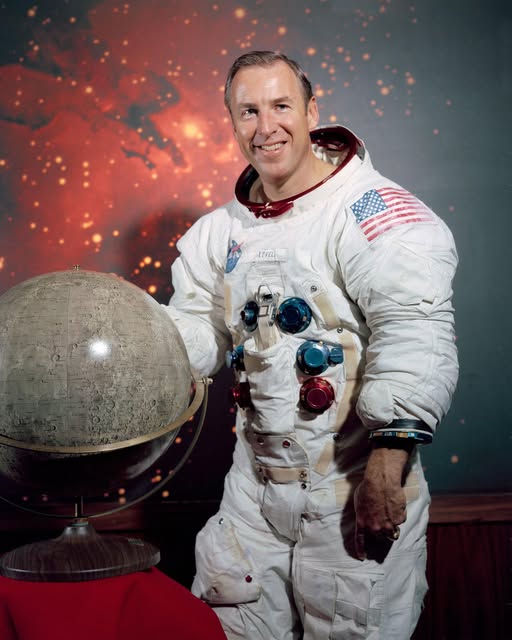James A. “Jim” Lovell Jr., Legendary Apollo 13 Commander and American Hero, Dies at 97
The World Mourns the Loss of a True Pioneer in Space Exploration and Service
It is with profound sadness that the world mourns the passing of James A. “Jim” Lovell Jr., a pioneering astronaut, decorated naval aviator, and enduring symbol of American courage and ingenuity. Lovell passed away peacefully on Thursday, August 7, 2025, at his home in Lake Forest, Illinois, surrounded by family. He was 97.
As one of NASA’s most respected and admired astronauts, Captain Lovell etched his name into the annals of history with his unmatched contributions to space exploration—most famously as the commander of the ill-fated Apollo 13 mission that became a story of survival, leadership, and human resilience.
A Life of Purpose and Exploration
Born on March 25, 1928, in Cleveland, Ohio, James Arthur Lovell Jr. grew up with a fascination for rocketry and aviation that would eventually launch him into the stars. He graduated from the United States Naval Academy in 1952 and earned his wings as a naval aviator the following year. He served with distinction as a test pilot before being selected as part of NASA’s second group of astronauts in 1962, often referred to as the “Next Nine.”
His career in space began with the Gemini 7 mission in 1965, where he spent 14 days in orbit—an endurance record at the time. Later that year, he flew aboard Gemini 12 with Buzz Aldrin, helping to prove that astronauts could perform tasks during spacewalks—an essential capability for future lunar missions.
Lovell’s role in the historic Apollo 8 mission cemented his place in history. Alongside Frank Borman and William Anders, he orbited the Moon on Christmas Eve in 1968—the first time humans had ever left Earth orbit. The crew’s reading from Genesis during a live broadcast from lunar orbit became one of the most iconic and poignant moments in the history of spaceflight.
But it was Apollo 13, in April 1970, that made Jim Lovell a household name. Originally planned as the third Moon landing, the mission quickly turned into a desperate struggle for survival after an oxygen tank exploded en route to the Moon. Facing dwindling power, loss of cabin heat, and limited water, Lovell’s calm leadership, precise decision-making, and unshakable focus helped guide his crew safely back to Earth. His steady voice and unwavering optimism in the face of crisis—“Houston, we’ve had a problem”—became a defining moment of the American space program and a lasting symbol of teamwork under pressure.
Though Lovell never walked on the Moon, he traveled farther from Earth than nearly anyone in human history and became a model of grace under fire.
Beyond the Stars
After retiring from NASA and the Navy in 1973, Lovell transitioned into business and public service. He held executive roles in the private sector and was an active speaker and advocate for science, space exploration, and STEM education. In 1994, he co-authored Lost Moon, the gripping account of Apollo 13 that became the basis for the Oscar-winning film Apollo 13, in which Tom Hanks portrayed him.
Lovell remained humble throughout his life, often crediting his success to teamwork and the unsung heroes of mission control. He continued to inspire generations of students, engineers, and dreamers with his quiet humility, thoughtful insights, and enduring belief in the power of human ingenuity.
He was the recipient of numerous awards, including the Presidential Medal of Freedom, the Congressional Space Medal of Honor, and the NASA Distinguished Service Medal. He was inducted into the U.S. Astronaut Hall of Fame and remained a revered figure in both military and space circles for decades.
A Beloved Husband, Father, and Patriot
To the world, Jim Lovell was an icon. To his family, he was a loving husband, devoted father, and proud grandfather. He is survived by his wife of 72 years, Marilyn Lovell, their four children—Barbara, James, Susan, and Jeffrey—and numerous grandchildren and great-grandchildren.
Despite his fame, Lovell remained remarkably grounded. Friends and family recall his gentle demeanor, sharp wit, and genuine curiosity about the world and people around him. He was known for welcoming visitors warmly into his home and for encouraging young people to pursue their passions with determination and integrity.
Marilyn, his lifelong partner and high school sweetheart, stood beside him through every triumph and every trial—from the early days of dangerous test flights to the anxious hours of Apollo 13. Their enduring love story, marked by loyalty and strength, inspired many who saw in their partnership a reflection of timeless American values.
A Legacy That Transcends Time
Captain James A. Lovell Jr. represents a golden era of exploration and a spirit of perseverance that transcends generations. He lived a life of service, courage, and purpose—pushing the boundaries of what was possible and showing the world what it means to lead with wisdom and humility.
His legacy will endure in the history books, in the halls of NASA, in the night skies he once traveled, and in the hearts of all who dream of reaching beyond.
A private funeral service will be held by the Lovell family, with plans for a public memorial to follow in the coming weeks. In lieu of flowers, the family asks that donations be made to science education programs or veteran support organizations in honor of Jim’s lifelong passions.
As we look up at the Moon—the destination he once neared but never walked—we remember the man who brought us closer to it with courage, grace, and an indomitable human spirit.
Rest in peace, Captain Lovell. You helped show us that even in the darkest moments, the light of ingenuity, hope, and humanity can guide us home.

Leave a Reply